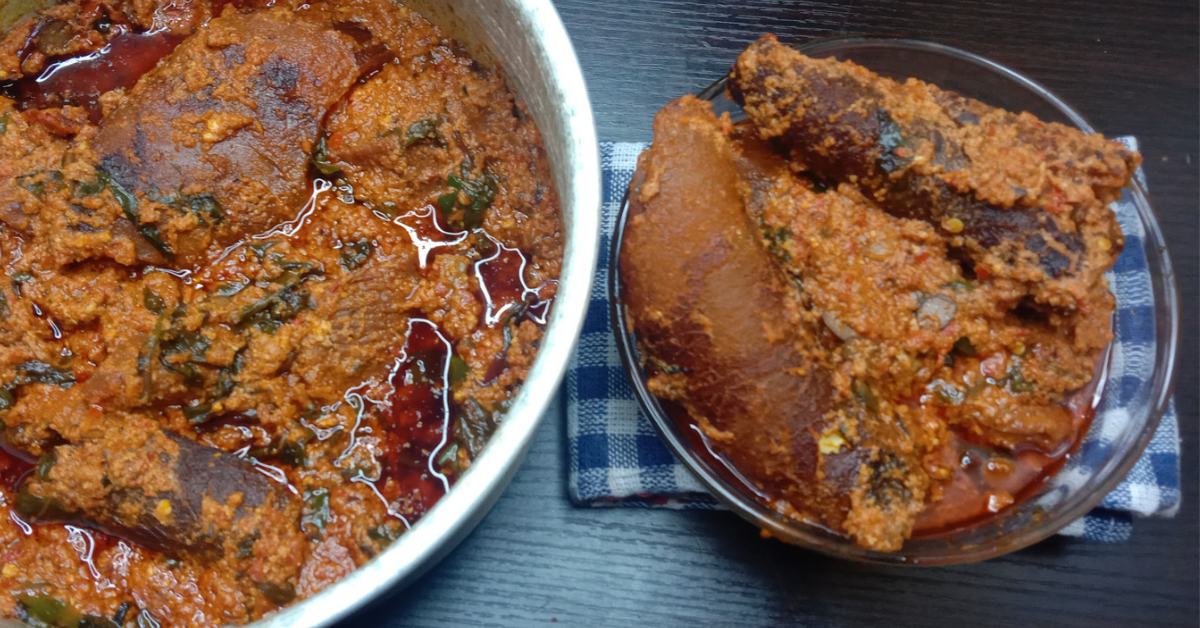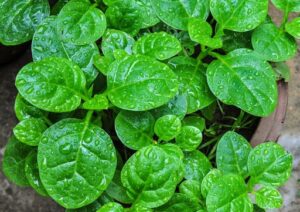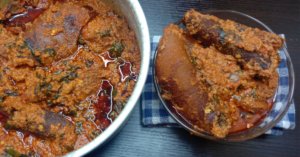
Egusi soup with Amunututu leaves
Egusi is a major ingredients in a lot of West African cuisine. It has name variations including Agusi, Ohue, Agushi and lots more.
Egusi soup is cooked with different methods and most of the commonly asked questions are;
- How to cook fried egusi soup – Click Here for recipe
- How to cook egusi soup boiling method
- How to prepare egusi soup with ugu –
- How to cook egusi soup with tomatoes (read till the end)
- How to prepare egusi soup with lumps and many more.
Just as there are a lot of questions on the various methods used to cook egusi. A lot of people are also very curious about the vegetables used to cook this delicious delicacy.
Efo Elegusi is a Yoruba word which means egusi soup cooked with leafy green vegetables such as;
- Ugu leaves (fluted pumpkin leaves)
- Shokoyokoto or Shoko ( Lagos spinach)
- Ewuro (bitterleaf)
- Efo tete ( African spinach/Callaloo)
- Gbure (Waterleaf)
- Efo Igbo or Efo gbagba ( African Eggplant leaves)
- Amunututu (Malabar spinach/Basella Alba)
- Afang /okazi leaves
This egusi soup recipe is about how to cook egusi soup with Amunututu leaves. As the name implies amunututu is a Yoruba word which means cool stomach.

Amunututu is known by different names such as Nigerian spinach, Toromogana, Malabar spinach or Alugbati in the Philippines.
The health benefits of amunututu leaves are numerous which includes;
- It nourishes the skin
- It reduces bad cholesterol in the body
- It helps control blood pressure
- Treats stomachache
- Improves the body metabolism
- It is also good for pregnancy
Nowadays, most people do not have access to this vegetable because it is not readily available in the market.
In fact I had to make a special request from my favourite vegetable vendor to help me get the vegetable because I missed enjoying the unique taste of this soup.
You can buy the ingredients for this recipe below. So, let’s quickly get down to this amazing recipe.
INGREDIENTS
Amunututu leaves
6 Tomatoes (optional)
3 Bell peppers
8 Scotch bonnet peppers
2 medium sized Onions
6 pieces Cow skin (ponmo)
7 pieces Beef
1 cup Meat stock
¼ cup Palm oil
Locust beans/Iru
¼ cup stock fish flakes
½ tablespoon salt
½ teaspoon curry
½ teaspoon thyme
4 tablespoons crayfish powder
2 seasoning cubes
1 cup grounded egusi
COOKING PREPARATIONS
Beef and Ponmo preparations
- Slice one (1) medium sized onions
- Get a clean pot
- Add 2 cups of water, sliced onions,¼ tablespoon salt, ½ teaspoon curry, ½ teaspoon thyme, 1 seasoning cube and sliced
- Add the beef and cowskin
- Cook for 15 – 20 minutes
- Strain the beef stock into a separate bowl
Egusi soup with Amunututu leaves Preparations
- Rinse the amunututu thoroughly in clean water
- Slice the leaves and set it aside
- Blend tomatoes, onions, bell peppers and scotch bonnet peppers to a rough consistency
- Pour ¼ cup of palm oil into a pot and heat up briefly
- Add the blended pepper mix
- Add locust beans, stock fish flakes, salt, crayfish powder, seasoning cube, cooked cowskin and cooked beef
- Mix well and cook till it thickens i.e till the liquid reduces
The liquid content in tomatoes is high, so the sauce needs to be cooked till it thickens in order to avoid having watery soup.
This is the reason why cooking this soup with tomatoes is optional.
But if you don’t have time to allow the liquid thicken , then it is better to use just onions, bell peppers and scotch bonnet pepper for the base sauce.
- When the sauce is moderately thick, add the grounded egusi
- Add meat stock
- Mix well
- Cook for 5-7 minutes
- After 5 minutes, mix the soup so that it doesn’t burn because egusi thickens fast
- If necessary cook for extra 2 minutes
- Add sliced amunututu leaves
- Mix well and cook for 5-7 minutes.
Egusi soup cooked with amunututu leaves is ready.


